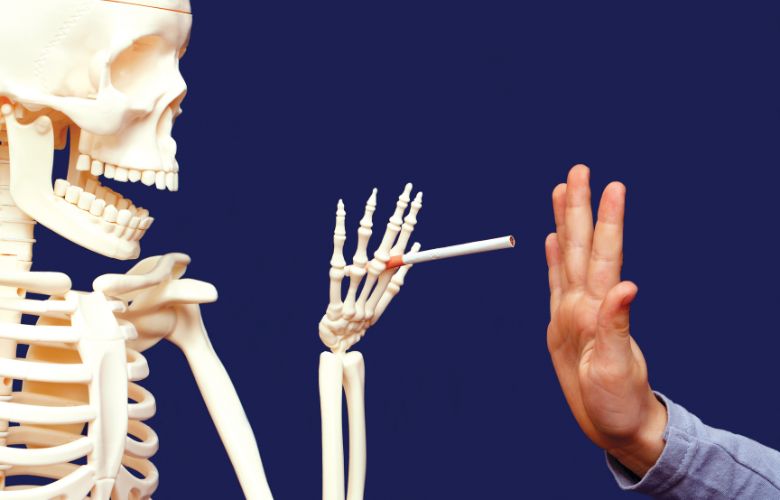A stroke can be a major life-changing event that has an impact on both our physical and emotional health. However, sometimes the bad habits and stressful situations that we put ourselves in are inevitable, and they will cause us to have a stroke. Thankfully, there are actions that we can do to reduce the risk of experiencing another stroke. Our risk of having another stroke can be considerably decreased by adopting some healthy lifestyle modifications and adhering to our doctor’s advice. We will go through some of the healthy habits that we should develop in this post in order to prevent having another stroke in 2023 and beyond.
Healthy Foods And Drinks

Those who have undergone stroke treatment have probably been told that they need to make a lot of changes to their lifestyle, and the biggest change is usually the one that revolves around nutrition. It is very important to choose which meals you are eating, as having another stroke could potentially be lethal.
It is suggested to eat foods that are low in saturated fats and trans fats so the cholesterol levels are not high, and limiting yourself on how much salt you take in order to lower the blood pressure. When both your cholesterol and blood pressure levels are high, the odds of a stroke are increased, so keep in mind what you eat. When it comes to drinks, the best thing is to drink water, as it is the best option.
Maintain A Good Healthy Weight

Maintaining a healthy weight is essential for reducing the risk of stroke. Being overweight or obese can increase the likelihood of developing other stroke risk factors such as high blood pressure, high cholesterol, and diabetes. These conditions can lead to the accumulation of plaque in the arteries, which can cause a stroke. By maintaining a healthy weight, you can lower the risk of developing these conditions and reduce the chances of another stroke. A healthy weight can be achieved by following a balanced diet and engaging in regular exercise. Consult with your doctor to determine a healthy weight range for your body type and create a plan to achieve and maintain it.
Exercise More Often

The chance of having another stroke can be lowered by engaging in regular exercise, which is a crucial part of a healthy lifestyle. You can enhance your general health and well-being by exercising regularly. Increased blood flow from exercise lowers the chance of blood clots forming in your arteries, which can cause a stroke. As blood pressure is a major risk factor for stroke, exercise can also help lower blood pressure. For the majority of the week, try to work out for at least 30 minutes each day. Walking quickly, cycling, swimming, or dancing are a few examples of this. Exercises that help to build muscle and improve endurance are available for strength training.
Selecting an exercise routine that is suitable for your needs and fitness level is important. Speak with your doctor about appropriate exercises or activities that you can do safely if you have mobility limitations or other medical conditions. Keep in mind that as your fitness level increases, you should progressively increase the length and intensity of your workouts. Find a workout program you like, and include it regularly into your day. If you struggle to keep up with an exercise regimen, consider finding a workout partner or enrolling in a group fitness class to help you stay motivated. You can dramatically lower your chance of experiencing another stroke by including exercise in your regular routine.
Avoid Smoking

One of the best methods to lower your risk of having another stroke is to refrain from smoking, which is a major risk factor for stroke. Smoking can raise your blood pressure and heart rate, which increases your risk of developing blood clots in your arteries. Additionally, it can harm the lining of your blood arteries, making them more vulnerable to the formation of plaque, which can result in a stroke. Although giving up smoking is difficult, doing so is vital for your health. There are several tools at your disposal to assist you in quitting, including counseling, support groups, and nicotine replacement treatment.
Consult your doctor for advice on the best ways to help you stop smoking. You might also try to stay away from settings that make you want to smoke, such as social gatherings where smoking is common. Quitting smoking provides other health advantages beyond lowering your risk of having another stroke, such as enhancing lung function, lowering your risk of heart disease and lung cancer, and enhancing your general health and well-being. Your chances of living a long and healthy life can be greatly increased by stopping smoking.
⇒ 5 Unhealthy Habits that Increase the Risk of Chronic Disease
Limit Alcohol Intake

Another crucial strategy to lower your risk of experiencing another stroke is to limit your alcohol consumption. While many would say that drinking alcohol is as bad as smoking, we all know that the effects of alcohol are not as bad. However, when it comes to getting a stroke, alcohol should be avoided, as it will raise your blood pressure. A form of abnormal heartbeat that can cause blood clots and stroke, atrial fibrillation, is another condition that is made more likely by alcohol. It is advised to keep your alcohol consumption at a reasonable level in order to lower your risk of having another stroke. For women, this implies no more than one drink per day, and for men, no more than two drinks per day.
Consult with your doctor or an expert in mental health if you are having trouble controlling your alcohol intake. To assist you in reducing or quitting drinking, they can offer advice and assistance. Limiting alcohol use has other health advantages beyond lowering your risk of having another stroke, such as lowering your risk of developing liver disease and certain types of cancer, as well as enhancing your general health and well-being.
Control Your Medical Conditions

According to doctors that specialize in neurology in Sydney, one of the most important things when it comes to avoiding another stroke is to take care of your other medical conditions as you are instructed. High blood pressure, high cholesterol, diabetes, and atrial fibrillation are a few illnesses that can make you more likely to suffer a stroke. Your chance of experiencing another stroke can be greatly diminished by controlling these disorders. Take your prescriptions as directed by your doctor—it’s one of the most crucial stages in managing medical disorders. Maintaining a close eye on your problems requires that you attend all of your doctor’s appointments and receive routine checkups.
A heart-healthy diet, frequent exercise, giving up smoking, and consuming less alcohol are just a few examples of lifestyle adjustments that you might need to undertake. Make sure to frequently check your blood pressure if you suffer from high blood pressure, and take any prescribed medications. Make sure to eat a low-cholesterol diet and take any medications your doctor has advised you to if you have high cholesterol. Monitoring your blood sugar levels and taking your medications as directed by your doctor is important if you have diabetes. If you have atrial fibrillation, be careful to take medications as directed by your doctor and adhere to any lifestyle recommendations they may make, such as reducing your coffee intake or avoiding certain medications that may cause atrial fibrillation.
Take Your Medication

One of the most important steps in lowering your risk of another stroke is to take your medicine as directed by your doctor. Medical disorders including high blood pressure, high cholesterol, and atrial fibrillation that raise the risk of stroke can be controlled with the aid of specific drugs. Your doctor could advise using diuretics, beta-blockers, or ACE inhibitors if you have high blood pressure in order to lower it. By lowering blood pressure and relieving pressure on your blood vessels, these drugs can help minimise the risk of stroke.
If you have high cholesterol, your doctor could advise you to take statins, which can help lower cholesterol and lower your risk of stroke. The way that statins function is by preventing the liver’s ability to produce cholesterol, which can help stop the artery plaque from forming. Beta-blockers, calcium channel blockers, or anti-arrhythmic drugs may be recommended by your doctor if you have atrial fibrillation in order to help control your heartbeat. The possibility of blood clots developing in your arteries, which can result in a stroke, can be lessened with the aid of these medications.
You must take your meds precisely as your doctor has advised. Don’t forget to take them at the same time every day and don’t miss any doses. In case you do miss out, no matter what kind of condition you suffer from, you should not take a double dose to “catch up” to what you forgot to take. If you have any negative effects or find it difficult to take your prescriptions, talk to your doctor about possible substitutes. Following the doctor’s instructions is very important, so as long as they are prescribing you medication, you should not stop taking it. Of course, if in the meantime you develop a condition that might interact with the medication you are taking, you should consult with your doctor.
Consult With A Doctor

The most important thing you can do in lowering your chance of suffering another stroke is to speak with your doctor. Medication is not the only reason to consult with a doctor. Since they are professionals who handle dozens if not hundreds of cases every day, there is nothing wrong with asking them for some kind of advice. If you are not sure what to do, or if you are feeling insecure about something, contact your doctor and ask them a question. There are no bad questions, especially if you already experienced a stroke.
Any potential stroke risk factors can be found, and a management strategy can be created with the assistance of your doctor. Monitoring your blood pressure, cholesterol levels, and other health issues that raise your risk of stroke is crucial and should be done on a regular basis at your doctor’s office. Managing whatever drugs you are taking and modifying your treatment plan as necessary are also something your doctor can assist you with. Regular checkups with your doctor are especially crucial if you’ve already experienced a stroke.
Your doctor can assist in keeping track of your progress and noticing any changes in your condition that might necessitate additional therapy. It is crucial to be up-forward and honest with your doctor about your daily routine, including any vices like drinking, smoking, and working out. You can make lifestyle changes that can lower your chance of having another stroke with the assistance and support of your doctor. Along with getting regular checkups, you should contact a doctor right away if you notice any signs of a stroke, such as sudden numbness or weakness in your face or limbs, difficulty speaking, or visual issues.
Final Word
Life after a stroke is certainly different, but if you have a positive mindset, you will have an easier time changing your lifestyle in a way that reduces the chances of having a stroke again. To prevent having another stroke, there are various healthy things you may do. One of the most effective ways to lower your chance of having another stroke is to maintain a healthy weight, exercise frequently, abstain from alcohol and tobacco use, control any underlying medical conditions, and take your medications as directed by your doctor.
You can dramatically lower your chance of having another stroke and boost your general health and well-being by changing your lifestyle and working with your doctor to treat any medical concerns you may have. Keep in mind to schedule routine checkups with your physician and to seek emergency care if you notice any stroke symptoms. Your entire health and quality of life may be significantly impacted by taking preventative measures to lower your risk of having another stroke. Your risk of stroke can be decreased, and you can live a long and healthy life, by prioritising your health and adopting smart decisions.


